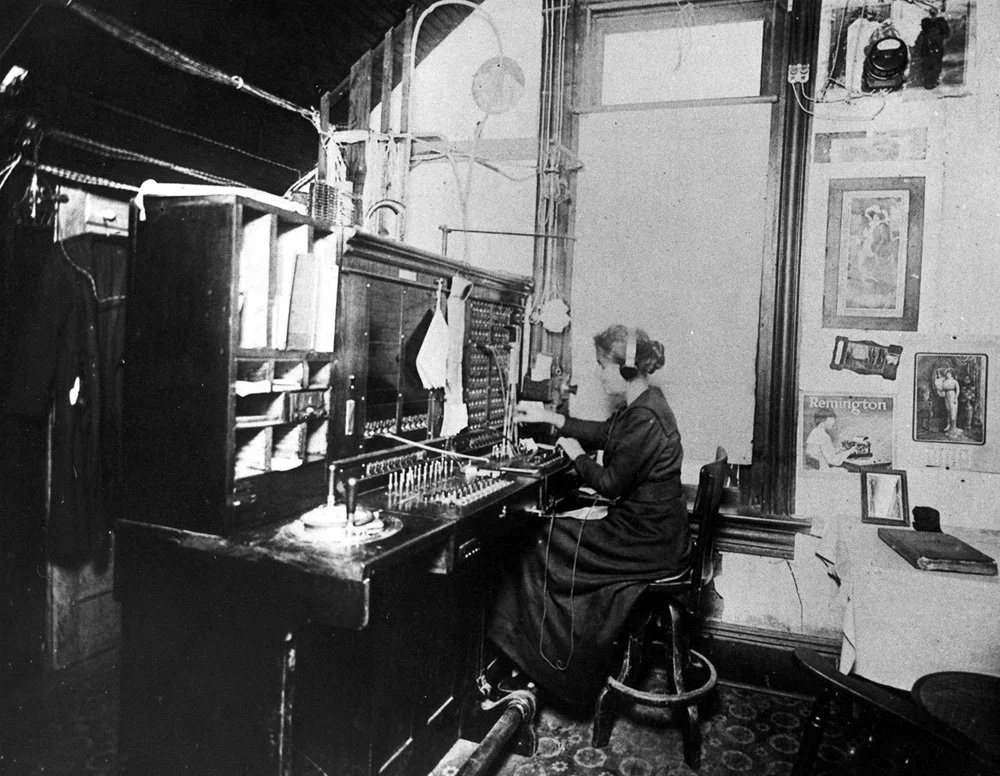Llewellyn King: The thrill of getting a human on the line; the ‘service economy’ is a giant con
Telephone operator circa 1900.
WEST WARWICK, R.I.
Something wonderful happened to me this week. I spoke on the telephone to a human being at a credit-card company. Well, not immediately. That would be too much to expect.
I had to go through some of the hoops of the company’s automated phone system, beginning with (as it always seems to) “Listen carefully because our menu has changed.”
And, of course, I had to enter the card number, the PIN, the last four digits of my Social Security number and my maternal grandmother’s name, and learn that for quality purposes my rising frustration was being recorded.
I explained repeatedly to the recording what I needed. It wasn’t having any of it. If it was a sample of artificial intelligence, it was acting more like artificial stupidity.
Finally, the AI device decided that stupid people – me -- weren’t worthy of its recorded messages and transferred me to a “representative.” Banks, credit- card companies, and insurance offices don’t have people; they have “representatives.”
This representative was smiley-voiced and delightful. She also was human. After 20 awful minutes of hearing a recorded voice (“How can I help you? I did not get that. Push 7.”), here was someone who really wanted to help. Hallelujah!
Try talking to a live person, you will like it. It is wonderful. She told me about the weather where she was, San Antonio, and we had a whale of a time doing something that I forgot people can do with a telephone: small talk. In a trice, she took care of my need.
I am a regular panelist on a weekly Texas State University webinar. A super-smart man, a polymath, suggested there that my problem for not reveling in the new isolation -- working from home, talking to machines, sending texts, rather than speaking on the telephone and emailing -- may be generational. This I take to be a nice way of saying that if people had sell-by dates, I am past mine.
The implication is that there is a superior place where the digital people do digital things, and pity those of us who do not do digital things, like eat, drink, fall in love. No less a person than the actor Meryl Streep said, “Everything that truly makes us happy is quite simple: love, sex and food.” If she likes talking, too, I will award her my personal Oscar. Another endearing Meryl quote is, “Instant gratification is not fast enough,”
There is one place where computers have not infringed on the old way of doing things: The U.S. Department of State. I believe that they are still looking up things in giant ledgers and writing by hand on parchment.
I say this because if you, dear citizen, wish to get a passport renewed, the expedited route at your local passport office takes five to seven weeks. I am waiting in apprehension for my renewal, having paid $200 for the super-slow “expedited service.”
You can get a replacement Social Security card in moments, a driver’s license immediately, but the State Department will have none of that.
Oddly, passports are issued to all except those with unpaid child support or outstanding criminal warrants. There are more reasons to deny a driver’s license than a passport. But the wheels at the State Department grind extremely slowly, and time isn't an issue.
The service economy has been a giant con, dreamed up by MBAs to keep customers at a distance or to dehumanize them so that they forget that they pay for the abuse they receive, whether it is from the passport office or some financial institution.
I frequent one gas station, in Scituate, R.I., where they still pump your gas. Night and day, there are lines of motorists waiting for fill-ups, and to have a few cheery words with the pump jockeys. Human contact, real service, seems to be worth a few cents more a gallon.
Llewellyn King is executive producer and host of White House Chronicle, on PBS. His email is llewellynking1@gmail.com, and he’s based in Rhode Island and Washington, D.C.
Hope Dam on the Pawtuxet River in Scituate

